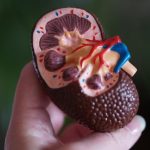Why high blood pressure and high blood sugar together are very dangerous
Blood pressure is a common issue affecting more than a billion people globally. It's especially prevalent in less wealthy countries.
In simple terms, blood pressure...
Breakthrough drug eculizumab offers hope for treating kidney disease
A new study led by experts from Newcastle University has found that eculizumab, a drug used to treat a rare kidney disease called Atypical...
Scientists find new drug to treat stomach cancer
For patients diagnosed with advanced gastric or gastroesophageal junction cancer, the prognosis has historically been bleak. However, new research may change that narrative.
A recent...
Scientists develop a headband to spot early Alzheimer’s disease
Alzheimer's disease is a scary diagnosis that often comes too late for effective treatment. But what if we could catch it years before memory...
Her heart stopped during a procedure to treat her stroke
Holly Page was having a great day. She got her hair done, then enjoyed a long dinner catching up with friend Lisa Stillings.
They were...
OIder people taking adult education classes have lower risk of dementia
Why Adult Education Matters for Brain Health
As we get older, many of us worry about staying mentally sharp. You've probably heard that puzzles, sudoku,...
A lifetime of challenges – including a spinal stroke – leads dancer to infinite...
As a Japanese American girl growing up in Irvine, California, Marisa Hamamoto felt like an outsider in her predominantly white community.
Her schoolmates picked on...
What to expect about this year’s virus season and why it might be different
Remember last year when we faced a tough "tripledemic" of flu, COVID-19, and RSV?
This year might be better thanks to some exciting new vaccines...
Why most heart attack survivors aren’t taking their life-saving daily aspirin
Despite years of research showing its benefits, most people who've survived a heart attack or stroke aren't taking a daily aspirin.
Aspirin is an inexpensive...
How black tea can help keep high blood pressure at bay
New research from The University of Western Australia suggests that drinking black tea might be more than just a comforting ritual. It could also...










